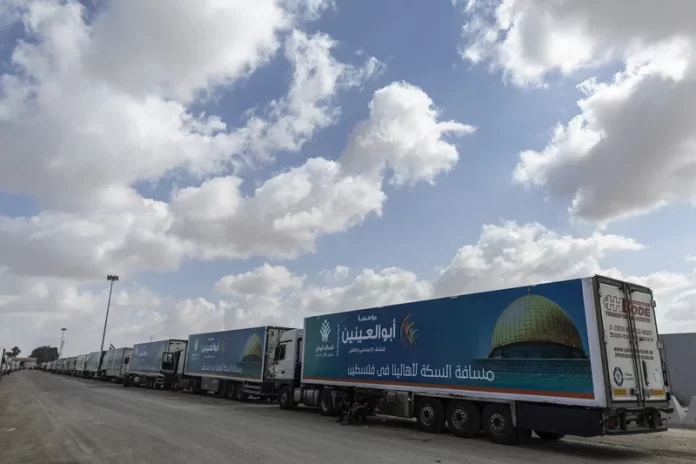With truckloads of aid waiting on one side and over two million Palestinians facing shortages of food, water and medicine on the other, all eyes Friday were watching the Rafah border crossing between Egypt and Gaza to see if a deal to deliver relief would hold.
After the White House announced the deal earlier this week to allow 20 trucks of aid into Gaza, negotiations over the logistics of the delivery continued into Friday morning — in part to address Israel’s concerns about how to keep the aid out of the hands of Hamas, the Gaza-based militant group whose deadly surprise attack on Israel earlier this month sparked the current hostilities.
Children make up nearly half of Gaza’s population. Here’s what it means for the war
A United Nations spokesperson told Reuters on Friday that a first aid delivery was due to start “in the next day or so.”
U.N. Secretary-General António Guterres, who arrived at the Egyptian side of the border crossing on Friday, called for aid to be allowed into Gaza as soon as possible.
“Civilians in Gaza lack all necessities of life,” Guterres said at a press conference. “I call for a humanitarian cease-fire to deliver aid to Gaza.”
Airstrikes continue as conditions deteriorate in Gaza
Gaza has been under total blockade by Israel since the days after the Oct. 7 attacks, in which 1,400 people were killed, according to Israeli officials.
Israeli officials say the siege is necessary to stamp out Hamas, which governs Gaza — and they will not allow in aid via Israel’s border crossings until Hamas releases approximately 200 hostages captured during the attack.
Gaza residents are facing an increasingly acute humanitarian crisis. The territory’s main power plant, desalination plants and wastewater facilities have all been unable to operate for days, the U.N. reports. Near-constant Israeli airstrikes have destroyed thousands of homes and killed more than 4,100 people, Palestinian officials say.
Aid must be inspected, Egypt raises its concerns
On a brief trip to Israel this week, President Biden had worked to convince Israeli Prime Minister Benjamin Netanyahu and Egyptian President Abdel Fattah el-Sisi to allow in aid.
Both countries have expressed concerns: Israel sought assurances that Hamas would not divert aid or use the trucks to smuggle in weapons, asking that U.N. workers inspect trucks before they entered Gaza. Egypt has said it will refuse the mass displacement of Palestinian refugees across its border.






















